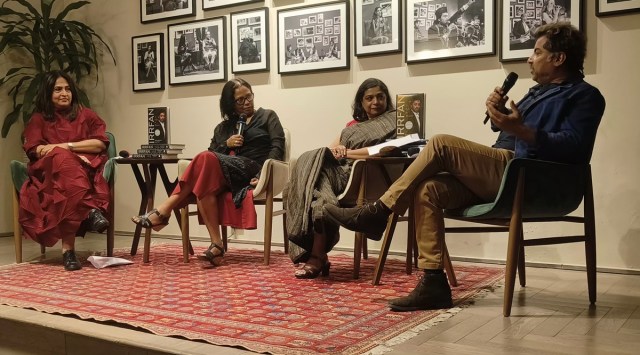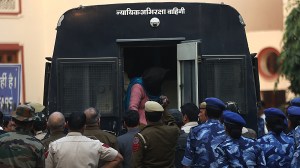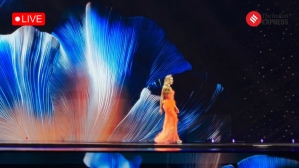Click here to follow Screen Digital on YouTube and stay updated with the latest from the world of cinema.
Sutapa Sikdar: ‘Irrfan Khan never changed himself from the core to become an actor; he was what he performed’
At release of The Indian Express film critic Shubhra Gupta's book 'Irrfan: A Life in Movies', his wife, writer-producer Sutapa Sikdar, talks about the late actor's beliefs and journey
 During the launch of the book, Irrfan: A Life in Movies, by The Indian Express film critic Shubhra Gupta (centre) in Mumbai on Saturday. Sutapa Sikdar (left), Khan’s wife, said that she had wanted to write a funny book about him. (Express Photo)
During the launch of the book, Irrfan: A Life in Movies, by The Indian Express film critic Shubhra Gupta (centre) in Mumbai on Saturday. Sutapa Sikdar (left), Khan’s wife, said that she had wanted to write a funny book about him. (Express Photo)Everyone knows Irrfan Khan as a serious person but “I wanted to write a funny book about him”, writer-producer Sutapa Sikdar, the late actor’s wife, said on Saturday.
“He was not a macho man but more of a gentle person, mindful of etiquette. When he suffered from neuroendocrine cancer that affected his gut, he used to pass wind a lot,” she said.
This unexpected consequence of Khan’s treatment also became “the funniest part” of his medical journey — from being something “embarrassing”, it slowly became part of their life as they came to terms with his illness, Sikdar said at the release of ‘Irrfan: A Life in Movies’, a book by The Indian Express film critic Shubhra Gupta (published by Pan Macmillan India; Rs 899) at The Quorum in Mumbai’s Lower Parel on Saturday.
When Gupta first approached her during the making of the book, which has more than 30 film personalities sharing their perspectives on Khan during in-depth conversations with the film critic, Sikdar was initially hesitant. But what got her interested was that the author was keen on focusing on the “professional aspect of Irrfan’s life”.
Through conversations featured in the book, Gupta turns the spotlight on Khan’s art, craft, life and legacy.
Speaking at the book release, Gupta said although she was initially sceptical about writing the book, what got her interested was that it was meant to be written “from the perspective of a film critic”. She said: “The idea was to look at his journey as an actor from the beginning of his career and his milestones. He was pushing the envelope as well as the boundary between films meant to be arthouse and popular.”
Sikdar said one can’t separate Irrfan the actor from the person he was. “He never changed himself from the core to become an actor. He was what he performed on screen — the middle-class parent in Hindi Medium (2017) or Yogi of Qarib Qarib Single (2017),” Sikdar said.
“Shubhra talks about Khan pushing the envelope, but the fact is when you come to Mumbai (Hindi film industry), the envelope becomes heavy — it’s not easy to push it. His strength of character lies in the fact that he pushed the envelope.”
Sikdar recalled that by the time Irrfan headlined Asif Kapadia-directed The Warrior (2001) he was about to give up acting due to lack of interesting offers. He was more keen on the intent of his movies than his character, and believed that the film should be “entertaining and not preachy”, Sikdar said.
“He, of course, looked at his role but he was particular about how the whole film was going to be…. He could not do the work he didn’t believe in. He read his script probably a hundred times,” she said. “He had a strong intent of doing good work.”
Khan’s son Babil, who made his acting debut in Qala (2022), read excerpts from the book where director Anup Singh recalls meeting him with the script of Qissa (2013) and what transpired between them.
During the discussion that followed, writer-producer Shailja Kejriwal, chief creative officer, special projects, Zee Entertainment Enterprises, spoke about working with Khan on various television projects for about a decade, how it was evident from the beginning that he was special, and the effect he had on those around him and viewers.
Actor Danish Husain moderated the discussion.
Besides a long-form introduction on Khan’s craft and legacy, Gupta, through her conversations with members of the film fraternity who knew the actor, worked with him, or observed him closely — Sikdar, Kejriwal, Shyam Benegal, Tigmanshu Dhulia, Vishal Bhardwaj, Naseeruddin Shah, Mira Nair, Konkona Sen Sharma, Tillotama Shome, Karan Johar, Anurag Kashyap, among several others — explores how his oeuvre transformed Hindi cinema.
The book also talks about Khan’s National School of Drama days to his nearly decade-long stint in television, and subsequently his arrival in the movies. It celebrates the “journey of an outsider that broke the star-actor binary and transformed Bollywood forever”.
This is Gupta’s second book after ’50 Films that Changed Bollywood, 1995–2015′, published in 2016.
- 01
- 02
- 03
- 04
- 05


































